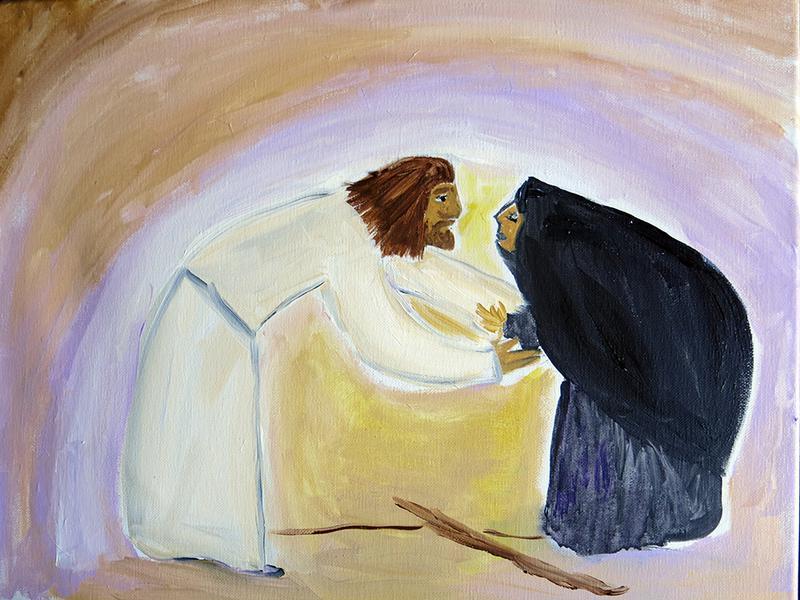Sunday 7 July, Trinity 6: Ezekiel 2:1-5, 2 Corinthians 12:2-10, Mark 6:1-13
Is this not...
Margaret the shopkeeper’s daughter?
Gordon the minister’s son?
Is this not...
David the stockbroker’s son?
Theresa the vicar’s daughter?
Keir the toolmaker’s son?
And they took offence at them.
Whatever their background, our politicians face judgement and scrutiny over where they come from. We are interested in their stories of origin, if you like.
Does it make them trustworthy and relatable or a good role model? Will it shape their policy decisions or inform how they govern?
At one end of the spectrum, Rishi Sunak was mocked for naming Sky TV as something he had to do without as a child; at the other Angela Rayner faced hostile comments about being a single parent, living in council housing and working in care.
Some take offence at them; others find inspiration.
Our own origin stories shape our attitudes and character; our priorities and commitments. Being a plumber’s daughter has perhaps shaped my vicar-ing more than anything else - watching my dad deal with emergencies, irregular hours, chatting over a cuppa, knowing his patch and having a pint in the pub.
Perhaps you’ve been told: remember who you are and where you come from. Do we hear it with a sense of pride and dignity or as a put down that keeps us in our place.
In today’s gospel reading, Jesus goes home. He’d got a reputation: calming storms, healing the sick, telling stories, earning the trust of those who followed him.
Now it’s his friends and neighbours who hear him teach. They are amazed by his wisdom. Astounded by what he says, by what he does. He’s got authority. He’s the local lad made good.
But that doesn’t last long.
They take umbrage. They know whose son he is. They know his trade. Aren’t his siblings still around. Who the heck does he think he is?
They take offence at him.
And that suspicion became a limiting factor: a lack of trust sucked out the oxygen of hope. Most of them were unable to see beyond the familiar; didn’t think God could transform lives through a person they knew. There were some though who took that imaginative leap - whose curiosity and embrace brought healing.
There were a few people who allowed Mary’s son to be seen: to see the fullness of God’s love in his wisdom and authority. A love that allowed them to be fully themselves - not defined by upbringing or status, background or age.
If we can grow beyond the stories people tell about us - the burdensome assumptions or shortcuts - then we can dare to offer that same space and encouragement to others; nurturing them so that their roots and rootedness can lead to flourishing and fruitfulness. To untangle the stories we tell about ourselves and others demands patience, kindness and wisdom.
The late evangelist and writer Rachel Held Evans describes this as spiritual maturity - a habit of ‘sorting fact from fiction (or, more precisely, truth from untruth), and embracing those stories that move us toward wholeness while rejecting or reinterpreting those that do harm.’
It takes humility. It might hurt. It does heal.
God chooses to dwell with us as Mary’s son. His origin story is well known - scandalous, humble, puzzling, familiar. The one who speaks of love, compassion, justice and hospitality; who casts our fears and reassures doubts. The one who leads us more deeply into truth; who enlarges our hearts and extends our horizons so that we too can serve others, rekindle hope and bring compassion a little closer.
In a sense, the refrain ‘remember who you are and where you come from’ becomes a more powerful origin story than we can dare imagine. Remember we are God’s children - bearing God’s likeness in the frailty of our bodies; bearing God’s love in our hearts.
We can’t outgrow that story or leave it behind. But too often the world with its dazzling prizes and competition for resources reduces us to the pull of selfish desires or market forces.
In response, God loves us and loves us to the end. Jesus may have been rejected by some who knew him too well, but that does not stop him extending that circle of invitation and blessing.
He does that by instructing others to share that work with him. He sends the disciples out in pairs - with simplicity, trusting in God and in the kindness of strangers. They are to accept what they need rather than seeking personal gain; staying where they’re made welcome, moving on if not. They are to follow Jesus and trust his authority.
Jesus had spoken in parables about God’s word being like seed - scattered with generosity, germinating and taking root unseen, but bringing forth a harvest or making space to shelter others in hospitality. The message they share points to Jesus but also to a new way of life; to the reign of God with justice and compassion, creativity and peace. Hope and change flows from this spirit of repentance - turning or returning to God’s ways.
Strangers become friends on this journey. Following in the way of Jesus, the disciples take on the responsibility of authority. But it is authority that does not coerce or oppress Rather it is authority exercised as the fellow traveller, the guest, the servant of others; the one committed to the well-being of the other; the one gesturing towards healing, wholeness and hope.
Such a pattern or practice is in stark contrast to the ways in which authority can be misused, exploited or abused. The church - both in our institutional life and in the life of individuals - is not immune from that. Our commitment to safeguarding helps us become a safer church - aware of our own biases, noticing things which may cause concern, being responsible and accountable.
When he writes to the church in Corinth, Paul distinguishes between true and false claims to authority. Just as the disciples relied on the authority of Jesus, so Paul reminds his hearers authority flows from God, whose love is made perfect in human weakness in Jesus and the ongoing work of the Spirit.
Such authority within the church has one purpose: building one another up, so that we can grow together into the full maturity of being human in Jesus. He mentions his own challenges to emphasise that it is God who is the source of strength and comfort in all that we experience. Within the limits of our humanity we can know grace to strengthen us in our service, to inspire us with compassion and creativity and to give us courage in the challenges we face.
Ezekiel too needed courage as he prepares to speak the word of the Lord to a stubborn and rebellious people. He moves them towards a vision of hope and restoration - encouraging them to reorder their lives according to God’s ways of justice, mercy and peace. Sometimes hope flows from the kind of tough love that Ezekiel expressed.
A change of government always brings with it change: of language, ministers, policies, supported by our civil servants. We pray for all those in public office - that service may indeed bring hope as our new PM puts it. We are to untangle the stories we hear so that truth might also build trust, as the political editor, the late Charles Reiss, put it.
But we also rest on the assurance that we do remember where we come from - those in this church and in our wider community. We are children of God, yet we sometimes find ourselves in exile from the kind of social life God desires for us. May our repentance, our turning to God in Jesus, enable us to seek the welfare of our city.

